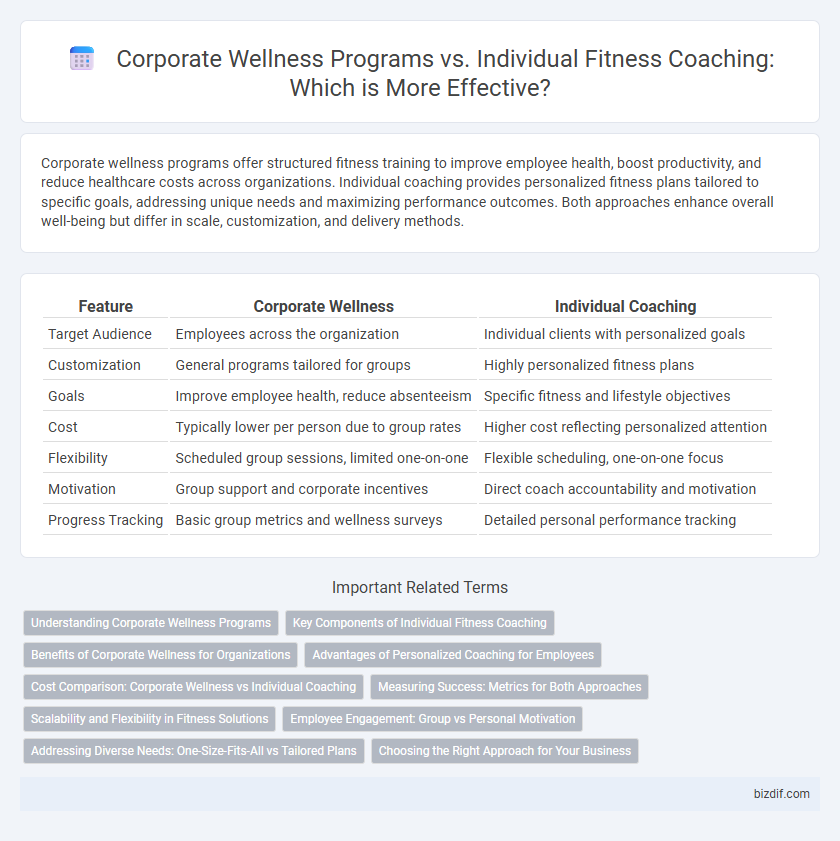Corporate wellness programs offer structured fitness training to improve employee health, boost productivity, and reduce healthcare costs across organizations. Individual coaching provides personalized fitness plans tailored to specific goals, addressing unique needs and maximizing performance outcomes. Both approaches enhance overall well-being but differ in scale, customization, and delivery methods.
Table of Comparison
| Feature | Corporate Wellness | Individual Coaching |
|---|---|---|
| Target Audience | Employees across the organization | Individual clients with personalized goals |
| Customization | General programs tailored for groups | Highly personalized fitness plans |
| Goals | Improve employee health, reduce absenteeism | Specific fitness and lifestyle objectives |
| Cost | Typically lower per person due to group rates | Higher cost reflecting personalized attention |
| Flexibility | Scheduled group sessions, limited one-on-one | Flexible scheduling, one-on-one focus |
| Motivation | Group support and corporate incentives | Direct coach accountability and motivation |
| Progress Tracking | Basic group metrics and wellness surveys | Detailed personal performance tracking |
Understanding Corporate Wellness Programs
Corporate wellness programs integrate fitness training, nutrition, and mental health initiatives to enhance employee well-being and productivity within organizations. These programs often include group workouts, health screenings, and personalized fitness challenges tailored to the company's demographic. Understanding corporate wellness involves recognizing its impact on reducing healthcare costs and improving employee morale, distinguishing it from individualized coaching that targets personal fitness goals.
Key Components of Individual Fitness Coaching
Individual fitness coaching emphasizes personalized workout plans, tailored nutrition guidance, and continuous progress tracking to optimize health outcomes. Coaches conduct detailed assessments to address specific goals, fitness levels, and potential limitations, ensuring targeted and effective training sessions. This bespoke approach enhances motivation, accountability, and overall performance compared to generalized corporate wellness programs.
Benefits of Corporate Wellness for Organizations
Corporate wellness programs enhance employee productivity and reduce healthcare costs by promoting healthier lifestyles and reducing absenteeism. These initiatives foster a collaborative work environment, improving morale and teamwork across departments. Investing in corporate wellness leads to long-term organizational benefits, including higher employee retention and reduced turnover rates.
Advantages of Personalized Coaching for Employees
Personalized coaching in corporate wellness programs enhances employee engagement by tailoring fitness plans to individual needs, improving overall health and productivity. Customized training addresses specific health concerns, reducing absenteeism and healthcare costs for employers. This targeted approach fosters a supportive work environment that motivates employees to achieve sustainable fitness goals.
Cost Comparison: Corporate Wellness vs Individual Coaching
Corporate wellness programs typically offer a more cost-effective solution by distributing expenses across multiple employees, reducing per-person training costs compared to individual coaching. Individual coaching, while often more expensive on a per-session basis, provides personalized attention and tailored fitness plans that corporate programs may lack. Businesses investing in corporate wellness can maximize ROI through improved employee health at a lower overall cost than the cumulative price of individual coaching sessions.
Measuring Success: Metrics for Both Approaches
Corporate wellness programs often measure success through employee participation rates, overall health improvements, reduced absenteeism, and lowered healthcare costs. Individual coaching typically tracks progress using personalized fitness assessments, goal achievement, body composition changes, and performance metrics such as strength or endurance gains. Both approaches benefit from combining qualitative feedback and quantitative data to evaluate the effectiveness and ROI of fitness interventions.
Scalability and Flexibility in Fitness Solutions
Corporate wellness programs offer scalable fitness solutions that accommodate large employee groups through standardized workouts and digital platforms, maximizing organizational health impact. Individual coaching provides unmatched flexibility by tailoring fitness plans to personal goals, schedules, and needs, enhancing motivation and adherence. Balancing scalability with customized approaches ensures effective fitness interventions across diverse populations and business sizes.
Employee Engagement: Group vs Personal Motivation
Corporate wellness programs leverage group fitness activities that foster team spirit and collective accountability, significantly boosting employee engagement through shared goals. Individual coaching, in contrast, tailors motivation strategies to personal goals and challenges, enhancing commitment by addressing unique fitness needs. Combining both approaches can optimize overall participation and satisfaction in workplace wellness initiatives.
Addressing Diverse Needs: One-Size-Fits-All vs Tailored Plans
Corporate wellness programs often implement standardized fitness routines designed to accommodate large groups, prioritizing general health improvements and fostering team engagement. Individual coaching delivers customized training plans that target specific fitness goals, injury prevention, and personal preferences, enhancing effectiveness and motivation. Tailored approaches address diverse needs more precisely than one-size-fits-all models, resulting in higher adherence and better long-term outcomes.
Choosing the Right Approach for Your Business
Corporate wellness programs foster team collaboration and improve overall employee health through group fitness activities, reducing absenteeism and boosting productivity. Individual coaching offers personalized fitness plans tailored to specific employee needs, enhancing motivation and achieving targeted health goals. Businesses should assess workforce size, budget, and health objectives to determine whether a scalable group approach or personalized coaching better aligns with their corporate wellness strategy.
Corporate Wellness vs Individual Coaching Infographic

 bizdif.com
bizdif.com